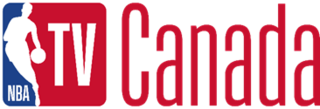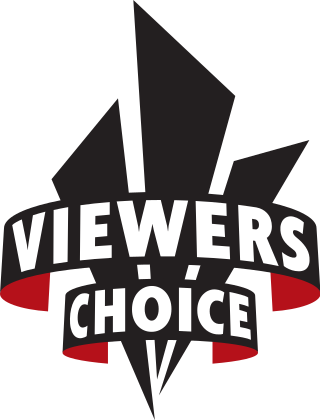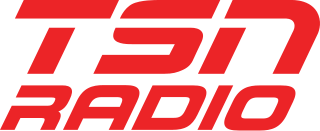
Citytv is a Canadian television network owned by the Rogers Sports & Media subsidiary of Rogers Communications. The network consists of six owned-and-operated (O&O) television stations located in the metropolitan areas of Toronto, Montreal, Winnipeg, Calgary, Edmonton, and Vancouver, a cable-only service that serves the province of Saskatchewan, and three independently owned affiliates serving smaller cities in Alberta and British Columbia. There is also one station using the brand name serving Bogotá, Colombia.
The Sports Network (TSN) is a Canadian English language discretionary sports specialty channel owned by CTV Specialty Television, owned jointly by Bell Media (70%) and ESPN Inc. (30%), itself a subsidiary of The Walt Disney Company. TSN was established by the Labatt Brewing Company in 1984 as part of the first group of Canadian specialty cable channels. In 2013, TSN was the largest specialty channel in Canada in terms of gross revenue, with a total of CA$400.4 million in revenue.
Sportsnet is a Canadian English-language discretionary sports specialty channel owned by Rogers Sports & Media. It was established in 1998 as CTV Sportsnet, a joint venture between CTV, Liberty Media, and Rogers Media. CTV parent Bell Globemedia then was required to divest its stake in the network following its 2001 acquisition of competing network TSN. Rogers then became the sole owner of Sportsnet in 2004 after it bought the remaining minority stake that was held by Fox.
CTV 2 Atlantic is a Canadian cable television channel serving Atlantic Canada owned by Bell Media, with its studios located in Halifax, Nova Scotia. Owned by the Bell Media subsidiary of BCE Inc., it operates as a de facto owned-and-operated station of its secondary CTV 2 television system.
Réseau des sports (RDS) is a Canadian French language discretionary specialty channel oriented towards sports and sport-related shows. It is available in 2.5 million homes, and is owned by CTV Specialty Television Inc.. Its full name translates as "The Sports Network", the name of its Anglophone counterpart, TSN.
Discovery Channel is a Canadian discretionary specialty television channel majority-owned by CTV Specialty Television, Inc., a subsidiary of Bell Media. It is headquartered at 9 Channel Nine Court in the Agincourt neighbourhood of Scarborough in Toronto, Ontario.
CBC Television is a Canadian English-language broadcast television network owned by the Canadian Broadcasting Corporation, the national public broadcaster. The network began operations on September 6, 1952, with its main studios at the Canadian Broadcasting Centre in Toronto. Its French-language counterpart is Ici Radio-Canada Télé.

Omni Television is a Canadian television system and group of specialty channels owned by Rogers Sports & Media, a subsidiary of Rogers Communications. It currently consists of all six of Canada's conventional multicultural television stations, which are located in Ontario, British Columbia, Alberta, and an affiliate in Quebec. The system's flagship station is CFMT in Toronto, which was the first independent multicultural television station in Canada.

Oprah Winfrey Network, more commonly shortened to OWN, was a Canadian English language discretionary service channel owned by Corus Entertainment. The network's owner, Corus Entertainment, licensed the OWN brand and its American programming from Warner Bros. Discovery.

Citytv Saskatchewan is a Canadian English language cable television channel in the province of Saskatchewan. Headquartered in the provincial capital of Regina, the channel is owned by the Rogers Sports & Media subsidiary of Rogers Communications and operates as a de facto owned-and-operated station of its Citytv television network. Its studios are shared with CBC's Regina studios on 2440 Broad Street in Downtown Regina.

NBA TV Canada is a Canadian English language discretionary specialty channel owned by Maple Leaf Sports & Entertainment (MLSE). It is the Canadian version of NBA TV, broadcasting programming focused on the National Basketball Association, and its Canadian franchise, the Toronto Raptors.
Sportsnet 360 (SN360) is a Canadian discretionary specialty channel owned by Rogers Media.

Viewers Choice was a Canadian English language pay-per-view (PPV) and near video on demand service. It was owned by Viewers Choice Canada Inc., which at the time of its closure was majority-owned and managed by Bell Media, with minority partners Rogers Media and ESPN Inc., and had been carried by various cable and IPTV service providers, primarily in Eastern Canada.
Sports broadcasting contracts in Canada include:
Sportsnet One is a Canadian English-language discretionary digital cable and satellite specialty channel owned by Rogers Sports & Media; it operates as a national sports channel complementing the Sportsnet group of regional sports networks. In addition to the national feed, the service operates a number of additional part-time "companion channels" which carry programming restricted to the local broadcast territories of the teams involved, such that the main feed remains available nationwide.

TSN Radio is a semi-national sports radio brand and part-time network in Canada carried on AM radio stations owned by Bell Media. The TSN Radio brand, and some of the stations' content, are shared with Bell Media's television sports channel, The Sports Network. With the American sports media company ESPN being a minority shareholder in TSN, most of the stations also air some ESPN Radio programming, usually on weekends and/or overnight.
CityNews Channel was a Canadian English language specialty digital cable television channel from 2011 to 2013. It was owned by the Rogers Media division of Rogers Communications, and primarily focused on the Greater Toronto Area (GTA). The channel was only available in Ontario and broadcast a single feed in high definition which was also accessible through standard definition televisions.

TVA Sports is a Canadian French-language sports specialty channel owned by the Groupe TVA, a publicly traded subsidiary of Quebecor Media. The channel is a general-interest sports network, and the first major competitor to RDS, the only other French-language sports channel in the country.
A Category C service is the former term for a Canadian discretionary specialty channel which, as defined by the Canadian Radio-television and Telecommunications Commission, operates under the conditions of license for "competitive Canadian specialty services operating in the genres of mainstream sports and national news".
Sportsnet PPV is a Canadian pay-per-view (PPV) service owned by Rogers Communications. It is the PPV service used by Rogers Cable, Cogeco Cable and Source Cable for offering out-of-market sports packages and occasionally other special events. Since October 1, 2014, Rogers and Source have also used Sportsnet PPV as their main general-interest pay-per-view provider, replacing Viewers Choice which shut down the previous evening. The service is co-branded with Rogers' sports channel Sportsnet.







